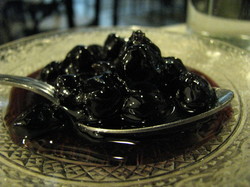Oil, vinegar and phonological assimilation
1 Comment
I’d always wondered why the oil and vinegar seemed to be labelled wrong in Spain. If, like me, you’re more familiar with Italian than Spanish, and you see two bottles on the table, one labelled “aceite“, you’d be pretty sure that was the vinegar. You’d be wrong, though – although admittedly you’d work it out pretty sharpish if you saw that the other one was labelled “vinagre“. Or just tasted it, I suppose.
The Italian aceto (vinegar) comes from the Latin acer meaning ‘sharp’ or ‘sour’, and that’s where we get English words like acid and acetic from too. (Even the word vinegar comes this way, in fact, via the French vin aigre or ‘sour wine’). Similarly, the word for ‘oil’ seems to have Latin origins in most European languages – the Latin oleum gives us oglio, oil, Öl, huile and so on. So why would Spanish (a Romance, i.e. Latin-based language) be so different, and where does their word for ‘oil’, aceite, come from? Well, now that we’ve made it to Morocco, all becomes clear …






